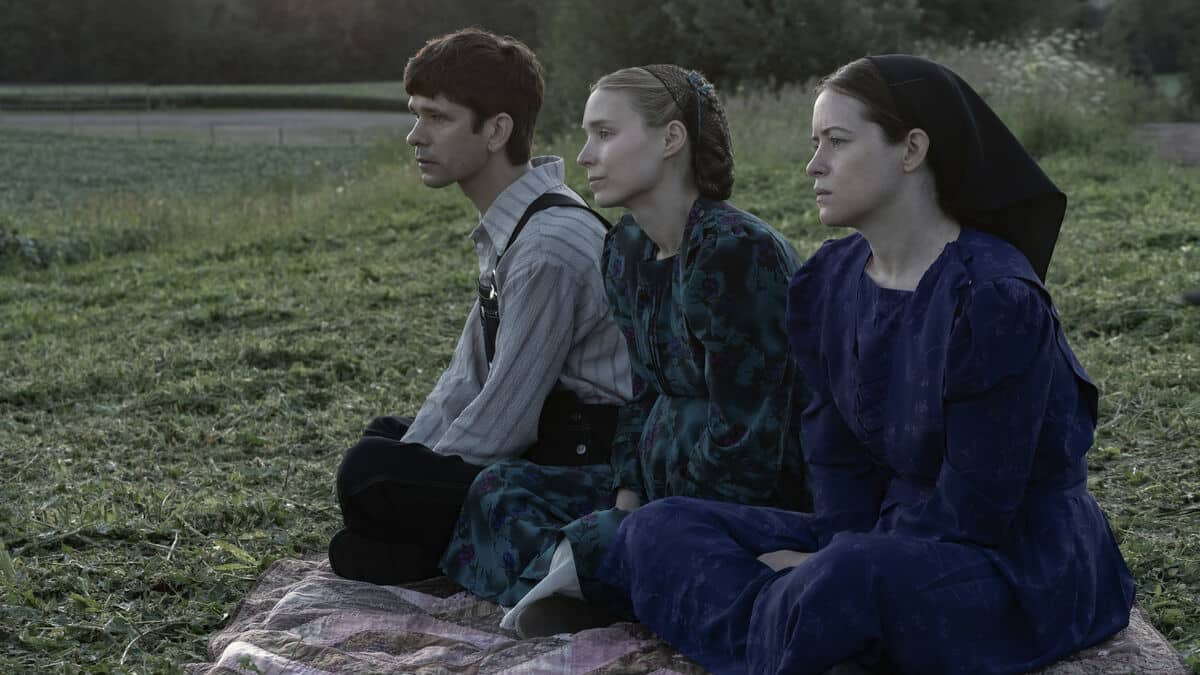The title Women Talking is a big clue as to what you can expect from Sarah Polley’s elegant, cerebral drama. Talk is what taps a deep well of many subjective experiences, and uses them as fuel for one focused, collective action. Here, a quiet revolution begins when disempowered people make themselves heard … and if you’re not here to listen, watch something else.
Content warning: this film – and hence this review – discusses sexual violence and post-traumatic stress.
An opening intertitle begins: ‘What follows is an act of female imagination.’ It’s a rich and ironic beginning, as we’re soon told that for years, men in an isolated Mennonite community have been raping women and girls after spraying them with cattle tranquilliser in their sleep. When they wake, bruised and bloodied, the community elders have dismissed their assaults as the work of the Devil, ghosts, or their own ‘wild female imagination’.
Now, we learn, the women are seizing an opportunity to imagine better lives for themselves.
They’ve managed to identify one perpetrator, who then named others. Out of their depth, the community elders have decided to let worldly law enforcement handle this volatile situation. As almost all the men travel to a nearby city to post bail, the womenfolk have two days to themselves – ostensibly to simmer down enough to ‘forgive’ and ‘apologise’.
Instead, they hold a plebiscite in the barn: should they do nothing; stay and fight; or leave?
When the votes are too close to call, 11 women meet in the barn to reach a final decision, recruiting the community’s milquetoast schoolteacher, August (Ben Whishaw), to take the minutes, since they themselves have been denied literacy. They represent three generations and hotly held opinions – and their debate is complex and frequently exhilarating.
Many voices, many views
Women Talking could be a challenging watch for viewers who are more used to encountering film dialogue as either pure tone or pure content. While there are some powerful lines here, there’s none of the quipping and bantering that often acts as lazy onscreen shorthand for ‘wit’. These women treasure their words and do not waste them.
Nor does this film indulge in dialogue-as-plot-exposition, or simplistic grandstanding. Polley, who also wrote the screenplay, sees her film as a space for characters to speak. Perhaps she prefers to leave the explaining to men. We don’t see much of the inciting action, and the dialogue is often elliptical, requiring an active viewer alert to subtext (I have a theory that August isn’t the ‘not-all-men’ milquetoast he seems).
Severe, scar-faced Janz (Frances McDormand), her daughter Anna (Kira Guloien) and granddaughter Helena (Shayla Brown) are traditionalists who refuse change. Two other older women want to leave: Greta (Sheila McCarthy) is reminded of how her two beloved horses instinctively respond to fear, while the wise Agata (Judith Ivey) muses, ‘Perhaps forgiveness can, in some instances, be confused with permission.’
Among the younger women, Ona (Rooney Mara) is oddly serene, considering she’s pregnant with her rapist’s child, while Salome (Claire Foy) burns with rage on behalf of her violated four-year-old daughter. Mariche (Jessie Buckley) argues for stoic forgiveness, scorning the bespectacled Mejal (Michelle McLeod) for indulging in ‘attention-seeking’ trauma responses such as panic attacks and cigarette smoking. But Mejal’s trauma comes from gaslighting: that ‘they made us disbelieve ourselves.’
This might suggest that Women Talking is a stagey, static, ‘theatrical’ film – but it isn’t. Polley understands the cinematic power of the close-up, and the camera frequently gets up close to the characters, capturing their gestures and micro-expressions in velvety lighting and a desaturated colour palette.
Instead of exposition, moments of action seep in like fond memories, or intrude like nightmares and traumatic flashbacks. And the themes of the film emerge through jousts of conversation and disagreement, through moments of consolation, rage and recrimination. Hildur Guðnadóttir’s score, and the hymns sung by the key characters, lend a sense of solemn ceremony.
One fraught plotline concerns Melvin (August Winter), a trans man who decided to come out after his own rape resulted in a miscarriage – fathered, he suspects, by his own brother. Melvin does not speak, except to children. The other characters, so sure of their gender solidarity, don’t seem to know what to do with Melvin’s slippery gender, and so they close ranks against him … even though he shares their experiences. Food for thought about trans-exclusionary feminism.
Storytelling as parable
Teenage Autje (Kate Hallett), daughter of Mariche and granddaughter of Greta, finds all this talk very boring … but hers is the voiceover that structures the film in flash-forward, as she narrates these events to Ona’s baby.
To quote the title of Polley’s 2012 film, Women Talking is also about the ‘stories we tell’: how women’s speech weaves their world into being through acts of storytelling. The film’s own genesis echoes this coming-into-being: Polley adapted a novel by Miriam Toews, which was itself loosely inspired by the rape of more than 100 women and girls over four years at the Manitoba Colony in Bolivia.
But the isolated rural setting, and the formal cadences and plain, old-fashioned dress of the characters, make it feel timeless and allegorical. There’s something of a Greek chorus in the women’s plural voices that cuts past any specific event to capture shared human values.
These are staunch Christians who take comfort in their faith, and fear being denied entry into heaven. But as they talk, they reject the idea that a just God requires this kind of suffering. There’s a striking ‘God’s eye view’ motif in the film, as women are seen lying in bed from above. And the camera frequently gazes down from high places, such as the barn hayloft where the key discussions take place.
Perhaps this film is best described as a parable: a rich moral teaching tool in the form of a story. Indeed, many original Christian doctrines emerged through stories a teacher tells his students, which witnesses like August collected as an ‘official’ book of faith. And, like faith, it places certain demands on the viewer. I loved it, and have thought so much about it. I hope others also allow it to speak to them.
Women Talking is in cinemas from Thursday 16 February.
Actors:
Director:
Format: Movie
Country:
Release:





